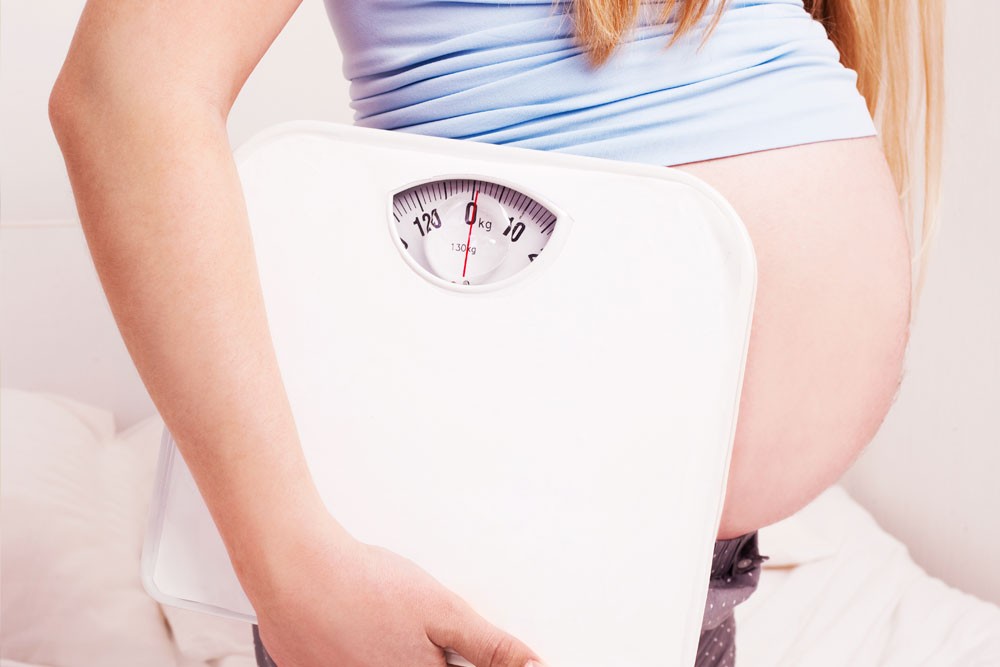
Nutrition and Weight Gain During Pregnancy
Recent studies have found that only about 1/3 of women gain the recommended weight during pregnancy. Gaining less than the recommended amount of weight during pregnancy can be associated with delivering a too small baby. Some babies born too small may have difficulty feeding, be at increased risk for illness, and may have developmental delays. Women who gain more than the recommended amount of weight during pregnancy have the potential to have a baby that is born larger than expected, leading to stillbirth, increased chances of cesarean section, increased risk of gestational diabetes, and delivery complications. Also, it can increase the amount of weight that a woman holds onto after pregnancy which can lead to obesity.
If before pregnancy, you were… You should gain…
- Underweight (BMI less than 18.5)
28-40 pounds (one baby) 50-62 pounds (twins) - Normal Weight (BMI 18.5-24.9)
25-35 pounds (one baby) 37-57 pounds (twins) - Overweight (BMI 25.0-29.9)
15-25 pounds (one baby) 31-50 pounds (twins) - Obese (BMI greater than or equal to 30.0)
11- 20 pounds (one baby) 25-42 pounds (twins)
Steps to Meet Pregnancy Weight Gain Recommendations
- Work with your health care provider on your weight gain goals at the beginning of pregnancy and regularly throughout your pregnancy.
- Eat a balanced diet high in whole grains, vegetables, fruits, low-fat dairy, and lean protein. Please reference the 'Healthy Eating Plate' picture.
- Limit added sugars and solid fats found in soft drinks, desserts, fried foods, whole milk, and fatty meats.
- Work up to or maintain at least 150 minutes of moderate-intensity aerobic exercise (such as brisk walking) per week. This may sound like a lot and seem overwhelming, but it can be broken up into 10 minutes at a time. Physical activity is healthy and safe for most pregnant women. Talk with your health care provider to determine if you have any physical activity restrictions.
- In general, extra calories are not required in the first three months of pregnancy. Typically, women need about 340 extra calories during the second trimester and 450 calories during the third trimester. It is essential to keep in mind that these calorie recommendations are if you are already eating a healthy diet and your plate looks like the 'Healthy Eating Plate' picture at mealtimes. If you are eating fast food and other non-healthy foods, you may not need to increase your calories.
Cravings and Aversions
Are you having sudden urges to eat pickles or sweets? Possibly both at the same time? Or does the thought or sight of some foods/smells make you completely nauseated? It is your natural hormones along with pregnancy ones that are the cause of these cravings/aversions as they are dramatically changing as you progress in your pregnancy. We would like you to avoid indulging in too many sweets but also not avoid eating altogether. You can enjoy sweets in moderation and try to find foods that sound good to you that are healthier options to substitute the aversions. If you start to crave odd substances such as laundry soaps, dirt, lint this can be an indication of a nutritional deficiency such as low iron. Please talk to your provider if you have further concerns.

Related Articles

Obstetrics and Gynecology
Medtronic Bladder Control Therapy
Evidence suggests that breakdowns in the bladder-brain communication pathway may be a root cause of...

Obstetrics and Gynecology
What Is Covered in a Well-Woman Exam?
Now is the time to find out what makes you feel happy, healthy, and strong. Your health is...

Obstetrics and Gynecology
OakLeaf Clinics Opens a Mothers' Milk Depot and Dispensary
Families in Eau Claire and the surrounding area can purchase pasteurized human donor milk or donate...

Obstetrics and Gynecology
Types of Urinary Incontinence
Stress Incontinence Urine leaks when pressure is exerted on the bladder by coughing, sneezing,...
